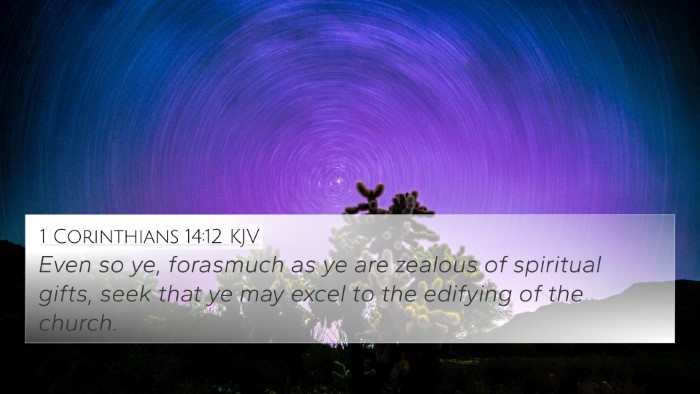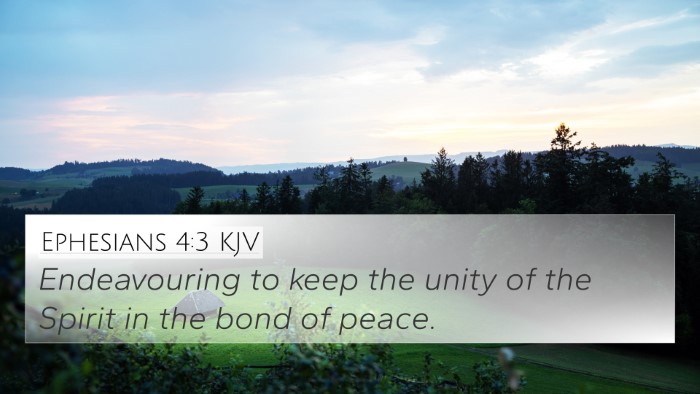Old Testament
Genesis Exodus Leviticus Numbers Deuteronomy Joshua Judges Ruth 1 Samuel 2 Samuel 1 Kings 2 Kings 1 Chronicles 2 Chronicles Ezra Nehemiah Esther Job Psalms Proverbs Ecclesiastes Song of Solomon Isaiah Jeremiah Lamentations Ezekiel Daniel Hosea Joel Amos Obadiah Jonah Micah Nahum Habakkuk Zephaniah Haggai Zechariah MalachiRomans 14:19 Similar Verses
Romans 14:19 Cross References
Let us therefore follow after the things which make for peace, and things wherewith one may edify another.
Uncover the Rich Themes and Topics of This Bible Verse
Listed below are the Bible themes associated with Romans 14:19. We invite you to explore each theme to gain deeper insights into the Scriptures.
Romans 14:19 Cross Reference Verses
This section features a detailed cross-reference designed to enrich your understanding of the Scriptures. Below, you will find carefully selected verses that echo the themes and teachings related to Romans 14:19 KJV. Click on any image to explore detailed analyses of related Bible verses and uncover deeper theological insights.

Ephesians 4:29 (KJV) »
Let no corrupt communication proceed out of your mouth, but that which is good to the use of edifying, that it may minister grace unto the hearers.

Hebrews 12:14 (KJV) »
Follow peace with all men, and holiness, without which no man shall see the Lord:

2 Corinthians 13:11 (KJV) »
Finally, brethren, farewell. Be perfect, be of good comfort, be of one mind, live in peace; and the God of love and peace shall be with you.

Psalms 133:1 (KJV) »
Behold, how good and how pleasant it is for brethren to dwell together in unity!

1 Thessalonians 5:11 (KJV) »
Wherefore comfort yourselves together, and edify one another, even as also ye do.

Colossians 3:12 (KJV) »
Put on therefore, as the elect of God, holy and beloved, bowels of mercies, kindness, humbleness of mind, meekness, longsuffering;

Philippians 2:1 (KJV) »
If there be therefore any consolation in Christ, if any comfort of love, if any fellowship of the Spirit, if any bowels and mercies,

Mark 9:50 (KJV) »
Salt is good: but if the salt have lost his saltness, wherewith will ye season it? Have salt in yourselves, and have peace one with another.

1 Corinthians 14:26 (KJV) »
How is it then, brethren? when ye come together, every one of you hath a psalm, hath a doctrine, hath a tongue, hath a revelation, hath an interpretation. Let all things be done unto edifying.

James 3:13 (KJV) »
Who is a wise man and endued with knowledge among you? let him shew out of a good conversation his works with meekness of wisdom.

2 Timothy 2:22 (KJV) »
Flee also youthful lusts: but follow righteousness, faith, charity, peace, with them that call on the Lord out of a pure heart.

1 Corinthians 10:33 (KJV) »
Even as I please all men in all things, not seeking mine own profit, but the profit of many, that they may be saved.

1 Corinthians 14:12 (KJV) »
Even so ye, forasmuch as ye are zealous of spiritual gifts, seek that ye may excel to the edifying of the church.

2 Corinthians 12:19 (KJV) »
Again, think ye that we excuse ourselves unto you? we speak before God in Christ: but we do all things, dearly beloved, for your edifying.

1 Timothy 1:4 (KJV) »
Neither give heed to fables and endless genealogies, which minister questions, rather than godly edifying which is in faith: so do.

1 Corinthians 7:15 (KJV) »
But if the unbelieving depart, let him depart. A brother or a sister is not under bondage in such cases: but God hath called us to peace.
Romans 14:19 Verse Analysis and Similar Verses
Understanding Romans 14:19
Romans 14:19 states, "So then, let us pursue what makes for peace and for mutual upbuilding." This verse encapsulates a key aspect of Christian life, emphasizing the importance of nurturing harmonious relationships within the faith community. Let's delve deeper into its meaning with insights from various public domain commentaries.
Contextual Background
The Apostle Paul addresses divisions that arose among early Christians, particularly between those who felt free to eat certain foods and those who abstained. It underscores the necessity of prioritizing love and understanding over personal liberties and preferences in matters that do not directly pertain to salvation.
Primary Insights
-
Matthew Henry:
Henry emphasizes that the pursuit of peace is not merely a passive state but an active endeavor, encouraging believers to contribute positively to the spiritual growth of one another. He states that every decision should be guided by the principle of promoting harmony and building others up in faith.
-
Albert Barnes:
Barnes reflects on the “mutual upbuilding” aspect, highlighting that Christian love should lead to actions that strengthen the community. He draws attention to the principle that believers must seek what uplifts their fellow believers, reinforcing the idea of community responsibility.
-
Adam Clarke:
Clarke speaks about the broader implications of this verse, connecting it to the overall theme of unity within the body of Christ. He suggests that pursuing peace and mutual edification requires humility and selflessness, as believers are called to set aside their own desires for the sake of others.
Bible Cross-References
This verse connects to several other scriptures that reinforce similar themes of love, community, and Christian conduct. Here are key cross-references:
- Romans 12:18: “If possible, so far as it depends on you, live peaceably with all.”
- 1 Thessalonians 5:11: “Therefore encourage one another and build one another up, just as you are doing.”
- Ephesians 4:3: “Eager to maintain the unity of the Spirit in the bond of peace.”
- Colossians 3:14: “And above all these put on love, which binds everything together in perfect harmony.”
- Hebrews 10:24-25: “And let us consider how to stir up one another to love and good works.”
- Galatians 5:13: “For you were called to freedom, brothers. Only do not use your freedom as an opportunity for the flesh, but through love serve one another.”
- Philippians 2:3-4: “Do nothing from selfish ambition or conceit, but in humility count others more significant than yourselves.”
Thematic Connections
Understanding Romans 14:19 within its context reveals vital themes that resonate throughout the New Testament. These include:
- Peace and reconciliation among believers.
- Encouragement and edification of the church community.
- The necessity of love superseding personal freedoms.
- Active engagement in the spiritual growth of others.
Operationalizing the Verse
To apply the principles of Romans 14:19 in daily life, one could consider the following actions:
- Practice open dialogues about differing opinions within the church to foster understanding.
- Engage in church activities that promote collective growth, such as study groups and service opportunities.
- Be mindful of personal habits and behaviors that might negatively impact others' faith journeys.
- Prioritize relationships within the community, ensuring that love and encouragement are at the forefront of interactions.
Conclusion
Romans 14:19 provides a profound guideline for maintaining unity and fostering love within the body of Christ. By actively pursuing peace and working towards mutual edification, believers can embody Christ’s call to love one another deeply. Engaging with cross-referenced scriptures enhances our understanding of this verse and reinforces the interconnectedness of Biblical teachings on community, love, and personal responsibility.
Further Study
Exploring how different verses relate to Romans 14:19 can be facilitated through various Bible reference resources. Consider using a bible concordance or a bible cross-reference guide as tools for deeper study. By doing so, one can uncover the rich tapestry of scriptural themes and their interconnections, enriching both personal study and communal learning.








